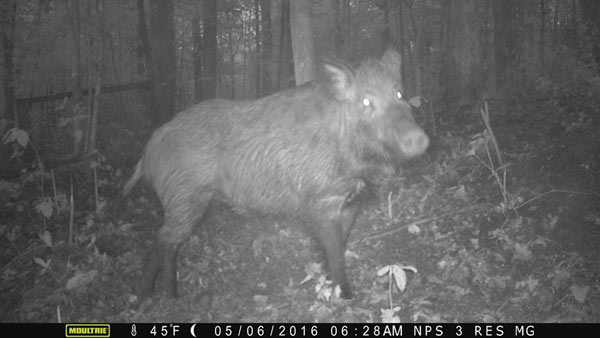|
You are viewing ARCHIVED content published online before January 20, 2025.
Please note that this content is NOT UPDATED, and links may not work. For current information,
visit https://www.nps.gov/aboutus/news/index.htm.

Contact: Jason Fisher, (423) 569-9778 Contact: Chris Derman The wild hog is an exotic invasive species that is significantly impacting the native resources at the Big South Fork National River and Recreation Area. The states of Tennessee and Kentucky consider wild hogs to be invasive animals. Little is known about the Big South Fork wild hog population, but the damage pigs are causing is threatening park resources including federally listed species such as the white fringeless orchid, Cumberland sandwort, and Cumberland rosemary. Hogs destroy wildlife habitat, as well as crops on private lands. Wild hogs can also contribute to the spread of disease, including pseudorabies and swine brucellosis.To better understand the wild pig population, the park has partnered with the University of Tennessee to conduct a wild pig research project that will include the capture and radio-tagging of wild pigs with GPS transmitters. This will provide multiple pig locations daily and will continue for 1.5 years. The data from this project will help to determine movement patterns of wild hogs including their responses to removal/hunting efforts and will also provide baseline data for the development of a wild hog management strategy for the park.
Wild pigs will be trapped and chemically immobilized during the animal handling procedure beginning May 2016 through December 2017. During hunting season, hunters are encouraged to not kill wild hogs with transmitter collars or eat wild hogs with transmitter collars. However, anyone that does acquire a transmitter collar is encouraged to contact Jason Fisher, Wildlife Biologist, at Big South Fork (423-569-9778), or contact the information found on the collar so that the transmitter can be placed on another wild hog to continue the research.
To learn more about nonnative species at Big South Fork NRRA, please use the following link: https://www.nps.gov/biso/learn/nature/nonnativespecies.htm
|
Last updated: May 17, 2016
